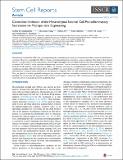| dc.contributor.author | Ranganath, Sudhir H. | |
| dc.contributor.author | Tong, Zhixiang | |
| dc.contributor.author | Levy, Oren | |
| dc.contributor.author | Martyn, Keir | |
| dc.contributor.author | Karp, Jeffrey M. | |
| dc.contributor.author | Inamdar, Maneesha S. | |
| dc.date.accessioned | 2017-04-10T14:35:43Z | |
| dc.date.available | 2017-04-10T14:35:43Z | |
| dc.date.issued | 2016-06 | |
| dc.date.submitted | 2016-05 | |
| dc.identifier.issn | 2213-6711 | |
| dc.identifier.uri | http://hdl.handle.net/1721.1/108002 | |
| dc.description.abstract | Mesenchymal stromal cells (MSCs) are promising therapeutic candidates given their potent immunomodulatory and anti-inflammatory secretome. However, controlling the MSC secretome post-transplantation is considered a major challenge that hinders their clinical efficacy. To address this, we used a microparticle-based engineering approach to non-genetically modulate pro-inflammatory pathways in human MSCs (hMSCs) under simulated inflammatory conditions. Here we show that microparticles loaded with TPCA-1, a small-molecule NF-κB inhibitor, when delivered to hMSCs can attenuate secretion of pro-inflammatory factors for at least 6 days in vitro. Conditioned medium (CM) derived from TPCA-1-loaded hMSCs also showed reduced ability to attract human monocytes and prevented differentiation of human cardiac fibroblasts to myofibroblasts, compared with CM from untreated or TPCA-1-preconditioned hMSCs. Thus, we provide a broadly applicable bioengineering solution to facilitate intracellular sustained release of agents that modulate signaling. We propose that this approach could be harnessed to improve control over MSC secretome post-transplantation, especially to prevent adverse remodeling post-myocardial infarction. | en_US |
| dc.description.sponsorship | United States. National Institutes of Health (HL097172) | en_US |
| dc.description.sponsorship | United States. National Institutes of Health (HL095722) | en_US |
| dc.language.iso | en_US | |
| dc.publisher | Elsevier | en_US |
| dc.relation.isversionof | http://dx.doi.org/10.1016/j.stemcr.2016.05.003 | en_US |
| dc.rights | Creative Commons Attribution-NonCommercial-NoDerivs License | en_US |
| dc.rights.uri | http://creativecommons.org/licenses/by-nc-nd/4.0/ | en_US |
| dc.source | Elsevier | en_US |
| dc.title | Controlled Inhibition of the Mesenchymal Stromal Cell Pro-inflammatory Secretome via Microparticle Engineering | en_US |
| dc.type | Article | en_US |
| dc.identifier.citation | Ranganath, Sudhir H.; Tong, Zhixiang; Levy, Oren; et al. "Controlled Inhibition of the Mesenchymal Stromal Cell Pro-inflammatory Secretome via Microparticle Engineering." Stem Cell Reports 6, no 6. (June 2016): 926-939. | en_US |
| dc.contributor.department | Koch Institute for Integrative Cancer Research at MIT | en_US |
| dc.contributor.mitauthor | Tong, Zhixiang | |
| dc.relation.journal | Stem Cell Reports | en_US |
| dc.eprint.version | Final published version | en_US |
| dc.type.uri | http://purl.org/eprint/type/JournalArticle | en_US |
| eprint.status | http://purl.org/eprint/status/PeerReviewed | en_US |
| dspace.orderedauthors | Ranganath, Sudhir H.; Tong, Zhixiang; Levy, Oren; Martyn, Keir; Karp, Jeffrey M.; Inamdar, Maneesha S. | en_US |
| dspace.embargo.terms | N | en_US |
| mit.license | PUBLISHER_CC | en_US |
